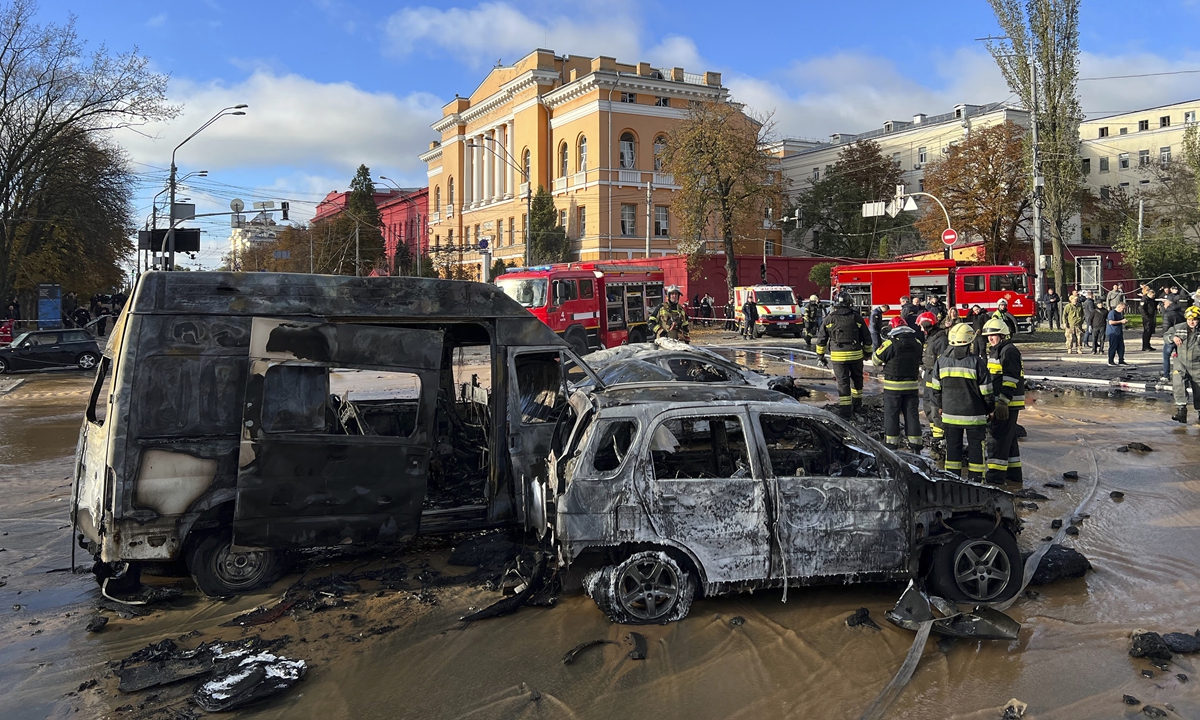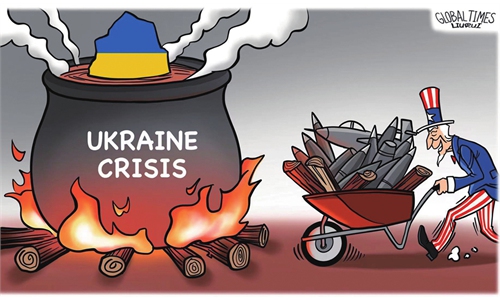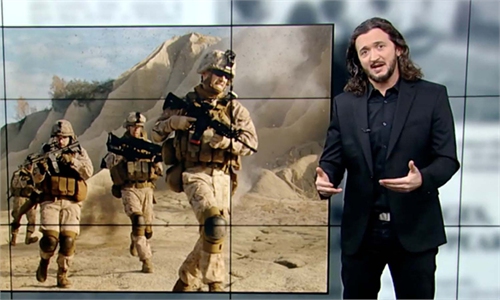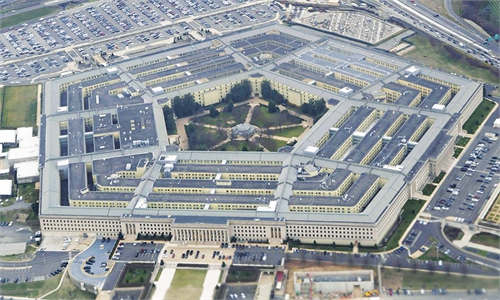
Rescue workers survey destroyed vehicles on a street in Kiev, Ukraine on October 10, 2022. Photo: VCG
Since the very beginning of the Russia-Ukraine conflict a year ago, one of the prime goals of the West was to isolate Moscow in the international system. To achieve this goal, it was not good enough to sustain the newly acquired Western cohesion; the real challenge was to bring to the "right side of history" as many nations of the Global South as possible. If the West were to succeed in this undertaking, Russia would become a truly "pariah state."However, this mission has turned out to be impossible to accomplish. Over the last year, in the Global South, as a rule, countries do not subscribe to the US or the EU anti-Russian sanctions. These countries have voiced opposition to expelling Moscow from important multilateral international organizations and forums and continue to host high-level delegations from Moscow and sign new agreements on cooperation with their business partners from Russia. In sum, the Global South so far has demonstrated a spectacular resilience in its commitment to stay out of the escalating conflict between Russia and the West.
This persistent resistance to the continuous pressure from the West calls for explanations. One of such explanations is a wide spread perception in the Global South that the Western approach to Ukraine is a clear manifestation of double standards. Not only did the West almost completely fail to resolve many bloody conflicts outside the Euro-Atlantic space, for instance, in Yemen or in Ethiopia, but it should even take direct responsibility for at least some of them such as Iraq and Libya. The sharp contrast between how Europe treats Ukrainian refugees and how it handled refugees from Syria a couple of years ago also suggests that the "universal" Western human rights" policies are in reality quite selective and biased.
Another explanation is that in the West the ongoing conflict in Ukraine is often presented as a part of the global clash between "good democracies" and "bad autocracies," as yet another crusade in defense of Western liberal values against the Eastern despotism. The fact is that many nations in Africa, Middle East and Southeast Asia can hardly fit the Western "democratic" standards; these nations were not even invited to the virtual Summit for Democracy hosted by the Biden administration in the end of 2021. So, why should these "disqualified" nations in the Global South stand by the principles of the club that they have not been admitted to?
Still, the most important reason for the Global South not to align with the West seems to be another one. The reality is that the West does not seem to be in any way interested in inviting the Global South to discuss the Ukraine crisis together in any depth in order to find an appropriate balanced and long-lasting solution. Instead, the West implicitly or explicitly suggests that the Global South should simply subscribe to all the positions already carved in stone by Western leaders, in particular, by the Biden administration in US. Nations in the Global South are looked upon not as full-fledged decision-makers, but rather as obedient decision-takers. Such one-sided views on how international problems should be addressed remind of the turn of the century unipolar world, in which the rules of the game were set almost exclusively by the White House. Needless to say, this is not a very appealing vision of the future world order for aspiring nations in the Global South trying to position themselves not as speechless objects, but as vocal subjects of global politics.
This is not to say that the Global South has not been affected by the crisis or that it has no stakes in the crisis resolution. The escalating conflict does have multiple implications for the international system at large, including global and regional security, international trade and finance. It distracts the attention of great powers from addressing such burning matters as climate change, food and energy security to less developed nations and many others.
On the other hand, the crisis has turned into an opportunity for leading actors in the Global South to demonstrate that they have their own agendas in global affairs, including their multiple proposals on managing various dimensions of the Russia-Ukraine conflict. It is not surprising to observe such proposals coming not only from major developing countries like China and India, but also from emerging regional leaders like Turkey, Saudi Arabia, South Africa and Indonesia.
The resolution of the crisis might well trigger long-awaited reforms in the global order, which should imply, among other things, a more prominent role for the Global South in the international system. That would arguably be the only silver lining in the cloudy and stormy international atmosphere of today.
The author is director general of the Russian International Affairs Council. opinion@globaltimes.com.cn




